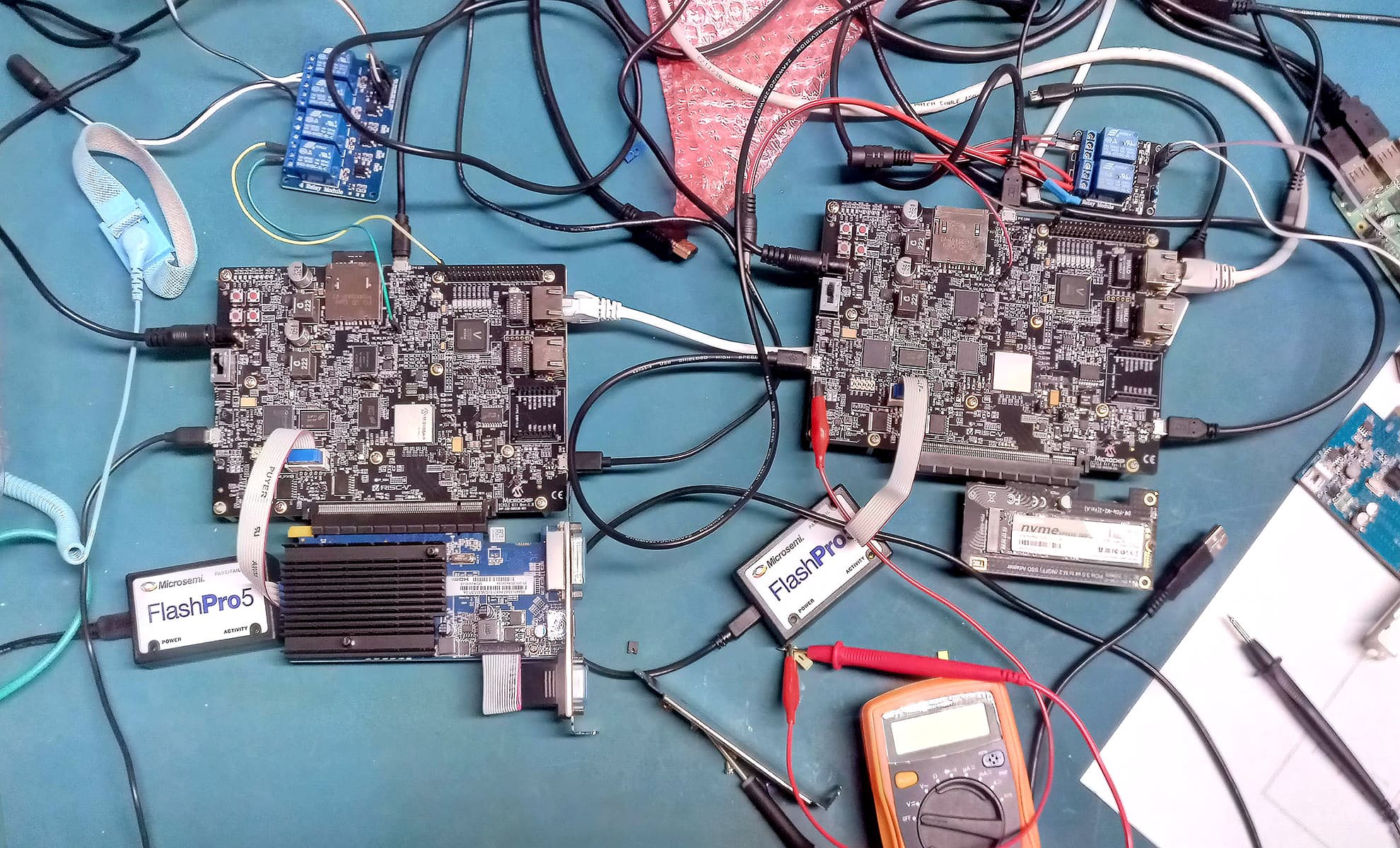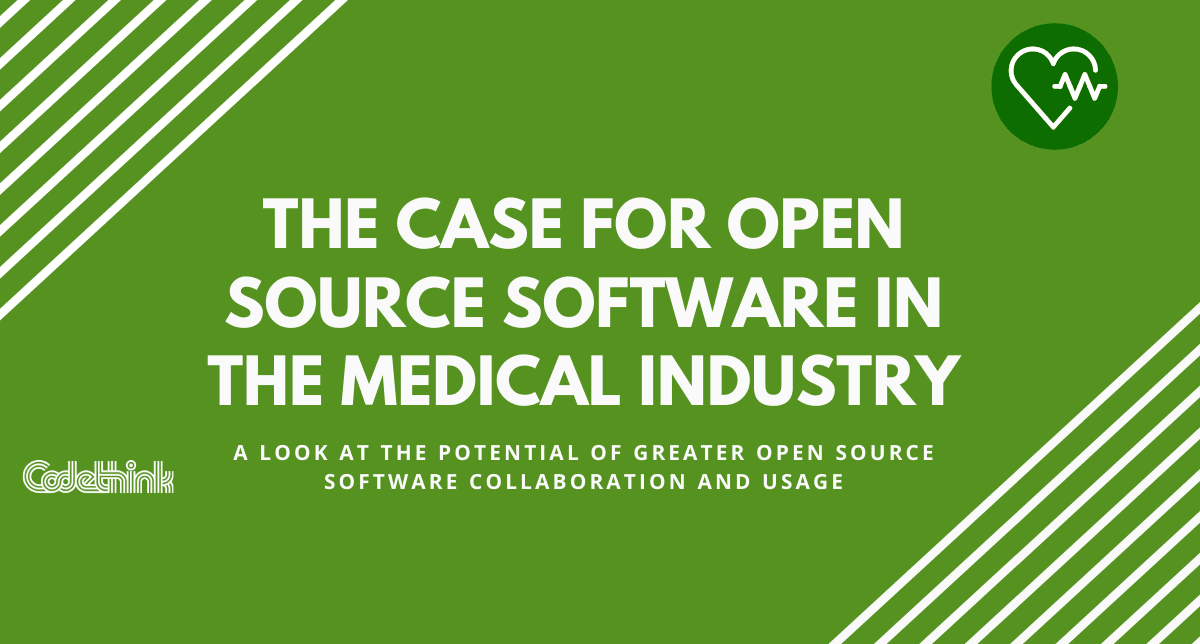Articles with tag 'Long Term Maintainability'

This is big news. It may not seem like it at first glance, but the impact could be huge.

Outreachy is an organisation providing open source internships to people who are subject to systemic bias and underrepresentation. Find out about the project we helped to run: "Improve end-to-end testing for GNOME"

Discover the latest updates to Codethink's QAD tool, including QAnvas Web UI, keyboard API, ILM optimizations, and static linking for improved testing.

Codethink has been developing a number of tools and processes in order to automate as much of the testing pipeline for embedded systems as possible.

Codethink is excited to announce its attendance at the upcoming SDV Europe conference in Berlin from November 26th to November 28th.

Continuing our work on robust testing in support of long-term maintainability, we present a testing pipeline that makes use of both LAVA and OpenQA to perform automated kernel tests on RISC-V hardware.

Codethink has automated some end-to-end testing of Android Automotive on our public openQA instance.

GUADEC 2023 has been another great event for the GNOME community.

Codethink's latest FOSS contribution in automated hardware testing. This article will talk about our recent tool named Q.A.D. and its impact on end-user blackbox hardware testing.

Learn to achieve long-term maintainability in embedded software with practical open source tools and best practices for effective support.

PyPI is a popular platform for sharing Python libraries. This article offers tips for safe use, considering recent malware attacks on the platform.

BuildStream 2.0 is finally here - with improved performance, remote execution support, and a host of new features.

GNOME OS and Atomic Upgrades on the PinePhone

Laurence Urhegyi and James Thomas will be giving the talk "Automated and continuous system testing with Lava and OpenQA"

The problem with introducing these dependencies, is that part of your project now exists outside of your control.

Everyone wants the same thing: stable software for the long term, including the latest features. To achieve this, you need to have confidence in your software and in the software you depend on, which has to come from testing.

High quality releases require high quality testing infrastructure. To show how deep OS and GUI testing can be done, let's look at the OpenQA instance we helped set up for GNOME.

You’ve made a choice to use open-source software as part of your product release. That’s a great start. Open-source software projects usually have large contributing communities that help improve the software’s quality and functionality over time.

For the last few months, the BuildTeam Community has been organising a meetup to gather like-minded community members to discuss, share and exchange innovations and relevant topics and systems in build.

Consuming open-source is only the start of the journey for many companies. Whether by design or necessity, organisations find themselves adapting from being simply open-source consumers to being full-fledged producers, contributors and maintainers, eventually working in public, following ‘open by default and ‘upstream first’ principles.

Bazel and BuildStream are tools which are commonly used to organize and delegate the building of software. There are a few key differences between them but largely they are concerned with the same development problems.

Buildstream projects can easily be consumed by Bazel projects by use of a bazelize element, offering greater flexibility and an easier path to integrating third party dependencies

Building and testing at scale often involves codebases with millions of lines of code, worked upon by thousands of developers. One solution to the problem of building as quickly as possible is simply delegating that responsibility — not to the machine that the developer is working on, or even to a server that the CI job has been dispatched to, but to a server farm...

Medical Devices are utilising software more than ever before. Recent challenges from COVID-19 have outlined some of the great benefits of utilising open source within the Medical industry. Chris looks at the benefits Open Source Software and projects could bring to the industry, as well as potential drawbacks of implementing an open-source initiative

As mentioned in the first part of this article, An Introduction to Distributed Builds and Remote Execution, there is no single solution to the problem of building software in a distributed manner. This description will focus on a solution based on the Remote Execution API.

Building software
Part of creating software involves translating source code into instructions that can be executed by hardware and packaging the results in a way that can be consumed by users. That process is known as building (although colloquially it sometimes can be referred to as compiling).
For small programs …

Over the last few years Codethink has been helping a series of customers understand and manage the scale and complexity of their software integration pipelines. We've seen and tried various approaches to visualise what's happening, but many projects end up falling back to some combination of:
- architecture diagrams
- data models …
Tag Index
- Aarch64 (2)
- ABI Stability (1)
- AGL (1)
- Algorithm (2)
- Android Automotive (1)
- Ansible (1)
- API (1)
- Architecture (2)
- Arm (2)
- ASIL D (1)
- Atomic Upgrades (1)
- Audio (2)
- Automation (2)
- Automotive (13)
- Automotive Grade Linux (1)
- Autonomous Vehicle (1)
- Azure (2)
- Baserock (6)
- Bazel (5)
- Bazelize (2)
- Big-endian (1)
- Bloodlight (3)
- Board Support Packages (1)
- British Cycling (1)
- Bugs (1)
- Build (3)
- Build Engineering (16)
- Buildbarn (2)
- BuildBox (4)
- Buildfarm (1)
- BuildGrid (5)
- Buildroot (3)
- BuildStream (12)
- C (2)
- Case Design (1)
- CD (2)
- Certification (2)
- Christmas (2)
- CI (3)
- CICD (11)
- CIP (3)
- CLI (1)
- Cloud (1)
- Cloud-native (1)
- CMake (2)
- CNN (1)
- Code Review (1)
- Coding Puzzle (1)
- Community (6)
- Compilers (4)
- Conferences (14)
- Continuous Delivery (2)
- Continuous Integration (1)
- Coronavirus (4)
- Culture (11)
- CVE (1)
- Data (2)
- Databricks (1)
- DebConf (1)
- Debian (1)
- Debugging (4)
- Decision Analysis (1)
- Devices (1)
- DevOps (2)
- Distributed Builds (2)
- Diversity (2)
- Drivers (1)
- Eagle (1)
- ELCE (1)
- Electric vehicles (1)
- Electronics (2)
- Embedded (12)
- End-User Black-Box Testing (2)
- Erasure Codes (1)
- Error Correction (1)
- Events (13)
- Firmware (4)
- Flathub (1)
- Flatpak (3)
- FLOSS (1)
- Fortran (2)
- FOSDEM (9)
- FOSS (39)
- FOSS Backstage (1)
- FOSS Community (2)
- FPGA (2)
- Freedesktop SDK (5)
- GENIVI (3)
- Git (3)
- GitHub (1)
- Gitlab (1)
- GitOps (1)
- GNOME (19)
- GNOME OS (8)
- GStreamer (1)
- GUADEC (5)
- GUI (1)
- Hamsa (1)
- Hardware (10)
- Hardware Testing (2)
- Heart Monitor (1)
- Heart Rate Sensor (1)
- Hypervisors (1)
- Icicle (1)
- Icicle-Kit (1)
- IEC 61508 (1)
- Infrastructure (2)
- International Women's Day (2)
- Internet of Things (1)
- Internship (3)
- Interrogizer (2)
- Interview (8)
- ISO 26262 (1)
- ISO 9001 (1)
- IVI (1)
- Jetson (1)
- Jsonnet (1)
- Kernel (13)
- Kicad (2)
- Lava (1)
- libabigail (1)
- Linux (31)
- Linux Foundation (5)
- Linux Kernel (4)
- LLVM (1)
- Long Term Maintainability (27)
- Long Term Support (1)
- Lorry (4)
- Machine Learning (3)
- Mainline (2)
- Masterclass (1)
- Medical Devices (7)
- Meetup (2)
- MEG Project (1)
- Microcontroller (5)
- Mirroring (4)
- Mobile Devices (1)
- NVIDIA (3)
- Open Hardware (1)
- Open Source (73)
- Open Source Project (1)
- Open Source Summit (2)
- Open Source Summit Europe (1)
- openQA (5)
- OpenSCAD (1)
- OpenStack (3)
- Partnership (7)
- Performance (4)
- PinePhone (1)
- Podcast (1)
- Productivity (2)
- Programming (2)
- Project Manager (2)
- PyCon (1)
- Python (4)
- QEMU (11)
- QNX (1)
- R155/R156 (1)
- RAAPI (1)
- REAPI (2)
- RECC (1)
- Remote Asset (1)
- Remote Execution (5)
- Reproducibility (1)
- Research (2)
- RHEL (1)
- RISC-V (15)
- Robotics (1)
- Rust (6)
- Safety (19)
- Safety Engineering (1)
- Safety System (3)
- Schemas (2)
- Security (7)
- Server (1)
- SiFive (1)
- Software (4)
- Software Engineering (4)
- Software Test Libraries (1)
- STAMP (2)
- STM32 (2)
- STPA (8)
- systemd (6)
- Terraform (1)
- Testing (13)
- Teufel (2)
- Toolchain (3)
- Tracking (1)
- Troubleshooting (3)
- Trustable Software (14)
- TX2 (1)
- Upstream (6)
- USB (1)
- User Group (1)
- Validation (2)
- Visualisation (1)
- Women in Tech (3)
- XML (1)
- YAML (2)
- Yocto (1)
- YOLO (1)
